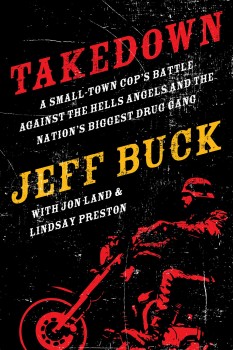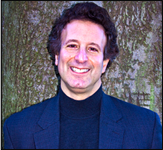Takedown by Jeff Buck with Jon Land & Lindsay Preston
 By Jon Land
By Jon Land
Truth really IS stranger than fiction.
Swearing off nonfiction forever after the amount of time I had to invest to complete my first effort, Betrayal, lasted all of two weeks. That’s when I got a call from friend and noted ghost writer Lindsay Preston who’d been offered a book she thought was too big to do for just a payday.
Was I interested? Well, like anytime the words “big” and “book” are used in the same sentence, you bet I was! And when Lindsay told me the book followed a Midwestern cop who toppled a drug gang consisting of the Hells Angels out of Canada, a corrupt Indian reservation in upstate New York, and the Russian mob, I started pacing the room with cell phone in hand.
“Did you know more drugs come into the US over the Canadian border than the Mexican border?” Lindsay asked me.
What? Huh?
I stopped pacing with visions of dollar signs and the New York Times bestseller list dancing in my head because I had my hook, the magic fact that can drive nonfiction in a way fiction can only dream of. And if all the facts didn’t substantiate the sell job I was giving myself, I’d deal with that later.
I’m a thriller writer, remember?
And that’s the great dividing line between fiction and nonfiction. When you write fiction, your job is to make your characters seem real. When you write nonfiction, your job is to make your characters seem fictional. It’s all about finding the subject’s voice, a fact I somehow disregarded when Lindsay and I crafted the initial portions of the book in third person. When the proposal constructed around those chapters was met with rejections across the board, I licked my wounds, climbed back on the horse, and rewrote all those pages in first person to find the voice of the book’s hero, Jeff Buck.
Hey, what did I just tell you about my experience writing Betrayal?
That’s when the book really started to click. I’m no journalist; I much prefer making stuff up for a living. But I supplemented all the one-on-one work Lindsay had already done with Jeff Buck, with hours and hours of interviews that saw me typing as fast as I possibly could to make sure I didn’t lose a single idiom or expression. Words like “show horses” to describe the glory hounds in law enforcement or “ass clowns” more likely to derail an investigation than nail the bad guys. Or incredibly rich anecdotes, like how going undercover at a Grateful Dead concert in his home state of Ohio during their Trucking Tour led ultimately to Jeff Buck busting the biggest LSD dealer in the country.
I kid you not.
But I did kid myself. Because Jeff Buck never actually shot it out with the Hells Angels or anybody else. Turns out that’s not the way this world works. When his Canadian counterparts arrested 143 Hells Angels in Montreal as part of a parallel investigation called Operation SharQ, not a single shot was fired. Drug investigations are about informants, wiretaps, assembling task forces, warrant writing, and making sure those ass clowns and show horses don’t screw things up. So TAKEDOWN ultimately became a blow-by-blow description of how drugs ended up in Jeff Buck’s backyard in Ohio and how he embarked on a quest to get them out of it.
Because that’s the thing. Jeff Buck is the real deal, one of the most celebrated undercover drug officers of this generation with a bevy of multi-million dollar busts to his credit in the shadowy netherworld where they don’t give out medals or commendations. In fact, he rightfully earned the nickname “Dope Ghost” for his ability to simply disappear after the case was done, having already moved on to his next undercover job in the alias he built over twenty years.
See, even the best publicist in the world has trouble getting any media to pay attention to fiction, no matter how bracing or factually-based it might be. Nonfiction, on the other hand, is a whole different ballgame, where a real life hero like Jeff Buck, and a concept as big and broad as the war on drugs, can hit lightning in a bottle when all the best fiction can muster is a minor thunderclap.
Will that happen with TAKEDOWN? It’s certainly possible. And wouldn’t that be ironic if my first New York Times bestseller turns out to be my second nonfiction book after 37 novels?
Like Betrayal, though, TAKEDOWN ended up taking a whole lot more time than I ever imagined so I’m done with nonfiction. I mean it this time. Really. Hold on, that’s Lindsay Preston calling again. . . .
Hey, you’re not going to believe this, but . . .
*****
 Jon Land is the USA Today bestselling author of the 38 novels, including seven titles in the critically acclaimed Caitlin Strong series: Strong Enough to Die, Strong Justice, Strong at the Break, Strong Vengeance, Strong Rain Falling (winner of the 2014 International Book Award and 2013 USA Best Book Award for Mystery-Suspense) and Strong Darkness (winner of the 2014 USA Books Best Book Award and the 2015 International Book Award for Thriller). His latest, Strong Light of Day, will be followed by TAKEDOWN, his second nonfiction book in the wake of his bestselling BETRAYAL, to be published in March 2016.. Jon is a 1979 graduate of Brown University, lives in Providence, Rhode Island.
Jon Land is the USA Today bestselling author of the 38 novels, including seven titles in the critically acclaimed Caitlin Strong series: Strong Enough to Die, Strong Justice, Strong at the Break, Strong Vengeance, Strong Rain Falling (winner of the 2014 International Book Award and 2013 USA Best Book Award for Mystery-Suspense) and Strong Darkness (winner of the 2014 USA Books Best Book Award and the 2015 International Book Award for Thriller). His latest, Strong Light of Day, will be followed by TAKEDOWN, his second nonfiction book in the wake of his bestselling BETRAYAL, to be published in March 2016.. Jon is a 1979 graduate of Brown University, lives in Providence, Rhode Island.
To learn more about Jon, please visit his website and follow him on Twitter (@jondland).
- LAST GIRL MISSING with K.L. Murphy - July 25, 2024
- CHILD OF DUST with Yigal Zur - July 25, 2024
- THE RAVENWOOD CONSPIRACY with Michael Siverling - July 19, 2024
